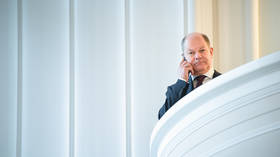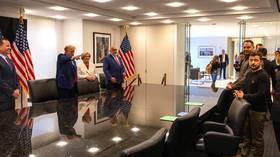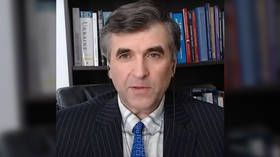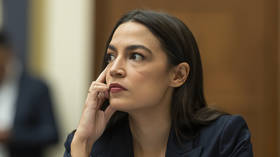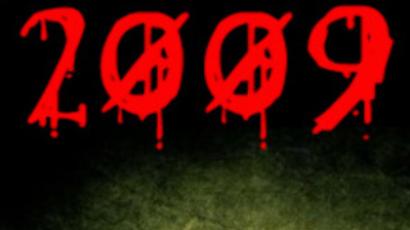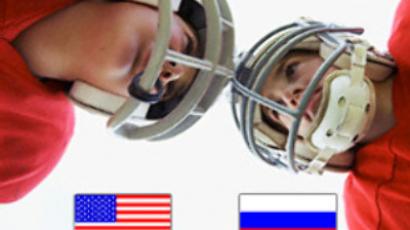Thursday's press review
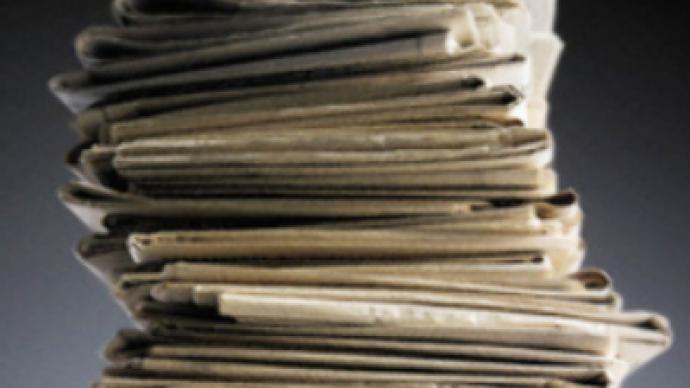
Russian newspapers report on a so-called ‘Lavrov Triangle’, explain how the European Union is wooing post-Soviet nations, analyse Russia-NATO relations and review the Doomsday predictions of American academics.
ROSSIYSKAYA GAZETA writes that the main theme of Foreign Minister Sergey Lavrov’s speech to the Association of European Business in Moscow was that Russia is ready for dialogue with the West in virtually every sphere.
Lavrov suggested that Russia, the EU and the United States build a “common economic space” based on an equal partnership, the paper says. The plan is not a utopia to be mulled over and only implemented in the future if an opportunity arises – but a call for immediate action, Lavrov said.
The minister didn’t avoid issues of concern that have accumulated in Russia’s relations with the West over the past few months. But he dismissed most of them as related to the division of spheres of influence in the post-Soviet space, the paper says.
While the EU and the U.S. have legitimate interests in the area, Lavrov reiterated that Russia has its legitimate interests too, and has to defend them. When former Soviet republics are pushed towards choosing between Russia and the West, it is absolutely unacceptable, Lavrov said.
Russia, the EU and the U.S. could do a lot of good together if they focused on combating common threats, such as organized crime and weapons proliferation, the minister said.
VREMYA NOVOSTEI says Lavrov’s speech was essentially a summary of Russia’s current foreign policy.
The minister intentionally avoided such topics as the Arctic and Iran’s nuclear ambitions, and concentrated on issues where cooperation between Russia and the West is possible and necessary, the paper says. Lavrov urged Western nations to forget geopolitical games for a while, as the global economic crisis requires a collective response from all the leading economies.
The paper says Lavrov addressed his speech first of all to the new U.S. administration of Barack Obama and European leaders. One of the main messages of the speech was that the days of a unipolar world are at an end.
He also said that the strategic partnership between Russia and the EU had weathered the storms caused by the Georgian attack on South Ossetia and its aftermath. The alliance found a new impetus in the peacemaking cooperation between Russia and France, which holds the rotating EU presidency, the paper says.
The fact that the Czech Republic will take the helm of the EU in January doesn’t augur well for Russian interests, the paper says. Czech officials have already been quoted by the media as saying that there is a need for the EU to build a stronger relationship with Washington.
Lavrov’s ‘Triangle’ initiative was “utterly surprising” and the idea partly resembles “a political daydream”, the paper says. At a time when the spheres of interests of Russia, the EU and the U.S. are not even clearly divided, it is too early to talk of a common economic space, the paper says.
In an article titled, ‘Partnership bypassing Russia’, the paper suggests that the EU is quietly building partnership relations with some post-Soviet states in Eastern Europe and the Trans-Caucasus. The EU programme is called ‘Eastern Partnership’ and includes the EU’s initiatives in Ukraine, Moldova, Georgia, Armenia, Azerbaijan – and even Belarus, if it becomes more democratic – the paper says.
The programme could follow earlier initiatives, which resulted in the signing of Association and Free Trade agreements with such countries as Iceland and Norway, the paper says.
The EU is making every effort to exclude Russia from this process, the paper says. But the process cannot be viewed as entirely anti-Russian, experts say, as the programme is “just an easy and comforting way of telling Ukraine and Georgia that the promises concerning their NATO membership have been withdrawn,” the paper says.
NEZAVISIMAYA GAZETA writes that a thaw has begun in Russia-NATO relations.
Russia’s envoy to NATO, Dmitry Rogozin, is scheduled to meet NATO Secretary General Jaap de Hoop Scheffer on December 18, and an informal meeting of the Russia-NATO Council is planned for January, the paper notes.
Rogozin says the talks will concentrate on Afghanistan and the fight against international terrorism – issues where cooperation has not been halted in recent months. The envoy considers his meeting with the NATO leadership a preliminary step to normalising relations, the paper says.
KOMMERSANT reports from a Washington conference on the impact of the global economic crisis, which was organized by the American Enterprise Institute for Public Policy Research. The academics, says the paper, presented different scenarios for the short-term prospects for the Russian economy and politics, from a doomsday picture of economic collapse and disintegration of government to milder forecasts picturing a relatively easy ride through the tough times.
In the worst-case scenario, U.S. academics suggest several factors that could have very negative effects, the paper says.
In that case, the bigger Russian banks would not finance domestic enterprises and even the big players in the real sector would have to borrow abroad, while the ‘mammoth state corporations’ such as Gazprom and Rosneft would consolidate assets – and the country’s population decline would continue.
In a more optimistic scenario, Russian economic growth would slow and the country’s international currency reserves would fall from U.S.$ 600 billion to U.S. $ 400 billion. But living through the crisis is going to be much easier for an average Russian than for an average American, because mortgages are not common in Russia, and the number of Russians involved with the stock market is insignificant in comparison with the country’s population, the paper says.
Evgeny Belenky, RT


